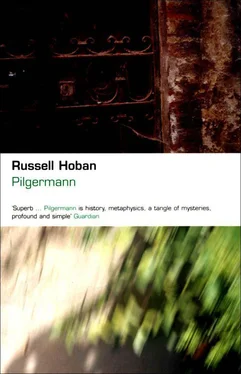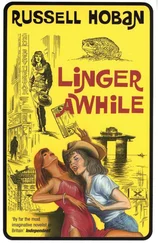Russell Hoban - Pilgermann
Здесь есть возможность читать онлайн «Russell Hoban - Pilgermann» весь текст электронной книги совершенно бесплатно (целиком полную версию без сокращений). В некоторых случаях можно слушать аудио, скачать через торрент в формате fb2 и присутствует краткое содержание. Год выпуска: 2002, Издательство: Bloomsbury Publishing PLC, Жанр: Современная проза, на английском языке. Описание произведения, (предисловие) а так же отзывы посетителей доступны на портале библиотеки ЛибКат.
- Название:Pilgermann
- Автор:
- Издательство:Bloomsbury Publishing PLC
- Жанр:
- Год:2002
- ISBN:нет данных
- Рейтинг книги:5 / 5. Голосов: 1
-
Избранное:Добавить в избранное
- Отзывы:
-
Ваша оценка:
- 100
- 1
- 2
- 3
- 4
- 5
Pilgermann: краткое содержание, описание и аннотация
Предлагаем к чтению аннотацию, описание, краткое содержание или предисловие (зависит от того, что написал сам автор книги «Pilgermann»). Если вы не нашли необходимую информацию о книге — напишите в комментариях, мы постараемся отыскать её.
Pilgermann — читать онлайн бесплатно полную книгу (весь текст) целиком
Ниже представлен текст книги, разбитый по страницам. Система сохранения места последней прочитанной страницы, позволяет с удобством читать онлайн бесплатно книгу «Pilgermann», без необходимости каждый раз заново искать на чём Вы остановились. Поставьте закладку, и сможете в любой момент перейти на страницу, на которой закончили чтение.
Интервал:
Закладка:
‘Why?’ I said.
‘That bear was finished,’ he said. ‘He had nothing left to live with. Did you understand what he was saying when he made his little speech?’
‘No,’ I said.
‘This is what he said to that man,’ said Bruder Pförtner: ‘“I never wanted to be anything but a friend to you. The only use I wanted to make of you was to be with you sometimes; nothing more than that, and I didn’t want any use to be made of me more than that. The first time I gave you honey it was just because honey was there, so we both had some of it, sharing like friends. But then you had to boast to everyone that you had a bear who found honey for you and I had to boast to everyone that I had a man who followed me to where the honey was. Then I showed you where the silence was and you thought I was God and I let you think it. We corrupted each other and so there had to be an end to it. Now I don’t think I can even find the silence for myself, I don’t think I even know how to be simply myself any more, and I want to go away and not be with anybody.” That’s what the bear said just before the man shot him.’
‘Poor fellow,’ I said.
‘People can’t let anything be,’ said Bruder Pförtner.said Bruder Pförtner. They can’t even let me be.’ even let me be.’
‘What do you mean?’ I said.
‘This very moment while we’re talking,’ he said, ‘you’re feeling more and more friendly towards me. Very soon you’ll be wanting to call me thou; next thing you’ll be wanting me to dance for your supper. Have no fear, I’ll dance for you; but not yet, not yet a little while. You mustn’t presume on this slight acquaintance just because I said you were going to sleep with me, you mustn’t become too familiar. Friendly, yes; but not too familiar.’ With that he disappeared.
I thought about Bruder Pförtner a little. I thought him visible again, trudging beside me companionably. ‘Why am I here?’ he said.
‘I just want you to know how things stand between us,’ I said. ‘I have no control over your actions but I am master of your appearances to me; my perception is the substance of your apparition, so you too must mind your manners if you want to go on being seen by me.’
Bruder Pförtner chuckled. Quite a remarkable sound, his chuckle: bony and brutish. ‘Anything you like,’ he said, and disappeared again. The manner of his chuckling made me unsure that I was master of his appearances to me; I thought him visible again but he did not appear, only his bony chuckle returned to jog along with me.
Ahead of me I heard the thin and straggling voices of children singing:
Christ Jesus sweet,
Guide thou our feet,
Our light in darkness be;
Make straight the way
By night, by day
That brings us, Lord, to thee.
The day, as I have said, was hot and still. Behind me in that heat and stillness were the dead bear and the crying man; farther back in the little dark wood in a shallow grave rotted the maggoty headless corpse of the tax-collector while the second Sophia prepared his head for the role of Pontius Pilate; in another grave lay the relic-gatherer whose life I had gathered up; and ahead of me the children sang with silvery voices in the dust of the dry road.
The humps and hollows of the landscape tend always towards the human: on this day the horizontal head of Christ was clearly visible in woods and fields and rocky outcrops. It was the head of the dead Christ brought down from the cross, his eyes closed, his passion complete. I sensed that it was important not to tilt my own head to the horizontal the better to see his face; while I had no wish to make with the vertical of my head and the horizontal of his a cross, neither could I in good conscience avoid it.
Nor mountains steep
Nor waters deep
Turn back the faithful soul;
Nor fire nor sword,
Christ Jesus Lord,
Jerusalem our goal.
So feeble, so wan those voices, like a candle flame in the sunlight. The dry and dusty road was ascending the brow of the horizontal head of Christ; the children would not be in sight until I reached the top of the hill. Long and long I toiled up the brow of Christ in the heat and the stillness of the day. When I reached the top I saw the children. They were moving very slowly in the glimmering heat and in the dust that rose up from their going. Peasant boys and girls they were, between twenty and thirty of them, the oldest of them twelve or thirteen but most of them younger, all of them thin and ragged, carrying their pitiful little bundles and singing thinly as they walked in the dry and dusty road.
As I watched them I heard again that bony and brutish chuckle: not only Bruder Pförtner but a whole company of him, a bony mob of him came trotting past me throwing off their monks’ robes and showing the tattered parchment of their skins stretched taut over their bones. All of them had great long bony members wagging erect before them so that it was difficult for them to run; all of them were giggling and chuckling as they stretched out their bony hands towards the children. When they reached the children they pushed them down on to their hands and knees in the dusty road, mounted them like dogs and coupled with them, grunting in their ardour, screaming in their orgasms. The children crept forward slowly on their hands and knees, singing as they were violated:
Christ Jesus mild,
Sweet Mary’s child
That hung upon the tree,
Thy cross we bear,
Thy death we share,
To rise again with thee.
When the skeletons had sated their lust they fell away from the children and lay sighing and snoring in the road with limbs outflung. The children, their hands and knees bloody, stood up again and trudged on.
Of the Rock that begot thee thou art unmindful,
and hast forgotten God that formed thee.
This has come into my mind as I ascend the stone brow, the horizontal broken rock of Christ who is of the broken Rock of God, the Rock that was shattered by the unfaith of its people, the Rock that was drained of its strength by the lust for the seen and by the whoring after no-gods. I remember how our old Rabbi has said that only once in the Holy Scriptures is the unpronounceable tetragrammation of God written with a small yod, and it is here in Deuteronomy that it is written so to show God’s loss of strength from Yeshurun’s disrespect:
But Yeshurun grew fat, and kicked:
thou art grown fat, thou art become thick,
thou art covered with fatness;
then he forsook God who made him,
and lightly esteemed the Rock of his salvation.
They provoked him to jealousy with strange gods,
with abominations they provoked him to anger.
They sacrificed to powerless spirits;
to gods whom they knew not,
to new gods that came newly up,
whom your fathers feared not.
Of the Rock that begot thee thou art unmindful,
and hast forgotten God that formed thee.
What is called time passes and yet all time is present; one has only to turn one’s head to see the happening of all tilings: there I am going up the ladder while Satan smiles and God perhaps weeps. God being omnipotent has the power, even while apparently absent, to manifest the idea of a weeping God. But God as It, God without personification — can it truly be that this God can be lessened and made weak by any human action, by my disrespect, by my adultery? I don’t know, I am full of doubt and worry as I ascend the broken rock of the horizontal brow of Christ.
When one is a child, when one is young, when one has not yet reached the age of recognition, one thinks that the world is strong, that the strength of God is endless and unchanging. But after the thing has happened — whatever that thing might be — that brings recognition, then one knows irrevocably how very fragile is the world, how very, very fragile; it is like one of those ideas that one has in dreams: so clear and so self-explaining are they that we make no special effort to remember. Then of course they vanish as we wake and there is nothing there but the awareness that something very clear has altogether vanished.
Читать дальшеИнтервал:
Закладка:
Похожие книги на «Pilgermann»
Представляем Вашему вниманию похожие книги на «Pilgermann» списком для выбора. Мы отобрали схожую по названию и смыслу литературу в надежде предоставить читателям больше вариантов отыскать новые, интересные, ещё непрочитанные произведения.
Обсуждение, отзывы о книге «Pilgermann» и просто собственные мнения читателей. Оставьте ваши комментарии, напишите, что Вы думаете о произведении, его смысле или главных героях. Укажите что конкретно понравилось, а что нет, и почему Вы так считаете.












